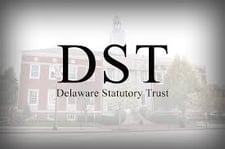A Guide To Your 1031 Exchange
A Delaware Statutory Trust is...
A Delaware Statutory Trust (DST) is a separate legal entity created as a trust under Delaware statutory law and recognized by the IRS for federal tax purposes. A DST allows a great deal of flexibility in designing and operating the entity that becomes the DST. Investors own a pro rata interest in the trust and have the right to receive distributions from its operation, either from rental income or eventual sale of the property. Investors do not have deeded title to the property. The trust has the deed to the property and makes the decisions regarding its disposition. The trust’s beneficiaries have no authority over the day-to-day handling of the property or the timing and details of its eventual sale. While initially this may seem disadvantageous for investors, it actually opens up the possibility for significant advantages
For the purposes of a 1031 tax-deferred exchange, the purchase of a beneficial interest in a DST is treated as a direct interest in real estate. This satisfies that requirement of IRS Revenue Ruling 2004-86, it can be used by other taxpayers in defense of a 1031 exchange position.
DSTs can also be attractive for investors not looking at a 1031 exchange. All the benefits of securitized real estate, as well as the financial specifics of the particular DST, remain. In addition, because it is a direct interest in real estate for tax purposes, the investor can perform a 1031 tax deferred exchange if and when the property is sold, thus beginning the cycle of tax-deferred real estate ownership.
Legal limitations and the nature of DST financing generally limit the use of a DST to properties leased to an affiliate of the sponsor (a master tenant) who will operate the property on a triple-net basis (a master lease).
A Delaware Statutory Trust is in the nature of a unit investment trust or a fixed investment trust. In such a trust, assets, securities, real estate, etc. are purchased for the trust and held until the proceeds are distributed to the investors. The trust is not considered a taxable entity and, therefore, all the profits, losses, etc. are passed through directly to the investors.
The business-trust concept, especially those that involve the holding of property, dates back as early as 16th century English Common Law. But until the passage of the Delaware Statutory Trust Act in 1988, no legal recognition of statutory trusts existed (12 Del. C. 3801 et. Seq.,). Statutory trusts were recognized as their own legal entity, separate from their trustee(s), offering freedom from the corporate law template. Within the tradition of trust law, freedom of contract allows the trustee(s) to structure their entity in a way that is most beneficial to the relationship of all parties and their expertise, while offering liability protection similar to that of a limited liability company or partnership.
Since 2000, Delaware statutory trusts have been used increasingly for tax deferral, asset protection and balance sheet advantages in real estate, securitization and mezzanine financing. For the purposes of owning a “direct interest in real estate,” which is critical to qualify for a 1031 exchange, IRS Revenue Ruling 2004-86 opened the way for DSTs to become the most common ownership structure for smaller investors to own investment-grade real estate with other investors. This ruling states that a beneficial interest in a DST that owned real estate would be considered a “direct interest in real estate” and thus qualify for 1031 exchange, assuming that all the other requirements are satisfied.
DST Risks
DST investment risks include but are not limited to:
- Relying on the program sponsor and their continued competency and success
- Sponsor insolvency
- Risks associated with giving a third party complete discretion for the management, leasing or disposition of the property
- Potential loss of entire investment principal
- Declining market values
- Tenant vacancies
- Illiquidity
If the property held by the DST is leveraged, there is the risk of being unable to re-finance the program at the end of the loan’s term. There is also the risk of possible conflicts of interest with program sponsors, trustees, or property managers.
In addition, there are tax-related risks when using a DST structure for a 1031 exchange. While the DST offerings are designed for this purpose and are accompanied by a legal opinion that they are suitable for 1031 exchange, there is no guarantee that the IRS will approve each individual DST structure or each individual exchange.
DST Benefits
In addition to all the benefits of securitized real estate, investors purchasing an interest in a DST enjoy the following additional potential benefits:
- No Need for Unanimous Owner Approval – Perhaps the most significant advantage of a DST structure is that it does not require the unanimous approval of the individual owners (investors) to deal with unexpected, adverse developments. During the Great Recession, some TIC structures were hindered from taking the necessary actions to mitigate losses. It is an additional protection to the investors that the signatory trustee is empowered to take necessary actions (restructure financing, renegotiate leases, sell the property, etc.) to reduce loss.
- Less Expensive, Easier Financing – Another major advantage of DSTs is that the lender deals with the trust as the only borrower, making it easier and less expensive to obtain financing. A TIC arrangement, in contrast, could require the lender to approve many different borrowers. An individual’s participation in the trust does not affect a personal credit rating.
- No Need to Sign Loan Carve-Outs – Because the investor’s only right is to receive distributions without any voting authority in the operation of the property, investor fraud carve-outs are eliminated. The lender looks only to the sponsor/signatory trustee for these carve-outs from the non-recourse provisions of the loan.
- Limited Personal Liability – DST investors enjoy limited liability, which protects their personal assets due to the bankruptcy-remote provision of the DST. If the trust fails and goes into bankruptcy, the most that investors would likely lose is their investment in the trust. Any potential creditors of the trust, or the lender, would be limited by provisions in the trust from reaching the other assets of the investors.
- Lower Minimum Investment – Because a private placement DST offering may have up to 499 investors, the minimum investment amounts are significantly lower. Most DST sponsors will set arbitrary minimum investment levels to limit the number of investors to a manageable number. Cash investments can be as low as $25,000, and 1031 exchange minimums are often $100,000.
- No Closing Costs – DST investors typically have no closing costs, saving as much as $5000 per investment.
- No Need to Maintain an LLC – DST investors do not have to maintain an LLC, avoiding annual state filing fees that can dilute cash flows.
- No Trustee Term Time Limit – The signatory trustee of the DST will generally be the sponsor of the private placement offering or one of its affiliates. With no one-year time limit on the trusteeship or the term of the property manager, lenders can gain comfort that the sponsor will have a continuing presence in operating the property.
- No Inadvertent Termination – A DST also has a Delaware trustee (required by statute), so there is no worry that the trust will inadvertently terminate.
Dos and Don’ts
DO Plan in advance. It’s the key to success in any exchange. Pay particular attention to the timing of the sale of the property you’re selling, estimating equity and debt replacement objectives to avoid boot, and retaining an expert QI (qualified intermediary).
DO Make every effort to sell before you purchase. If you identify an ideal replacement property before you sell, you may need to negotiate a reverse exchange (i.e., buying before selling). The IRS has guidance on this in Revenue Procedure 2000-37, but either the replacement property or the sale property must be parked with an Exchange Accommodator Titleholder for 180 days, pending the successful completion of the exchange.
DO Be mindful of the “napkin test” in a balanced exchange.
- If you are trading down in total value, you are potentially taxable to the extent of the trade-down.
- If you are trading down in equity, you are potentially taxable to the extent of the trade-down.
DON’T Miss your deadlines. The IRS will not honor the exchange if you miss the 45-day identification period or if you do not acquire the replacement property within the 180 day exchange period.
DON’T Change how
Ownership Structures Used for 1031 Exchange
 The Delaware Statutory Trust (DST) and Tenancy in Common (TIC) are the two most common ownership structures for investors who would like to access investment-grade properties together with other accredited investors. Both can qualify as a like-kind interest in real estate for the purposes of a 1031 exchange.
The Delaware Statutory Trust (DST) and Tenancy in Common (TIC) are the two most common ownership structures for investors who would like to access investment-grade properties together with other accredited investors. Both can qualify as a like-kind interest in real estate for the purposes of a 1031 exchange.The TIC structure dates back to English common law and has been the traditional vehicle for multiple-owner 1031 exchanges in the US. In the last 10 years, most investors have begun using the DST structure. It is considered a simpler, more flexible vehicle for owning investment real estate with some tangible advantages for the investor.
Both DSTs and TICs are usually available as turnkey, pre-packaged investments, with management and non-recourse financing in place. Therefore, they offer superior efficiencies in the identification, acquisition, financing, closing, and operating stages of real estate ownership. These efficiencies are advantageous and often critical if you face strict time restrictions for funding the investment through a 1031 tax-deferred exchange.
In addition to DSTs and TICs for a 1031 exchange, you can consider the options of oil and gas offerings designed for this purpose.
Risks of a 1031 Exchange
A 1031 exchange investment carries several risks, including but not limited to:- If the strict timeline and procedural rules are not followed, the 1031 exchange may be disqualified.
- There are no guarantees that
- The IRS will approve each individual exchange
- Tax laws will not be altered in the future
- The IRS will not change its application of present law to future cases


